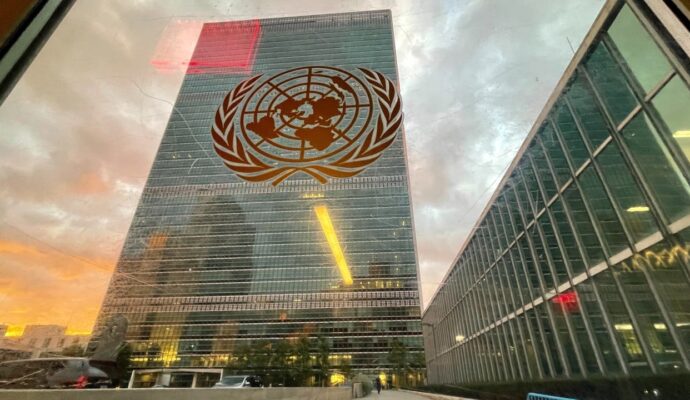The world is a more dangerous place.
Global conflicts have doubled over the past five years, according to Armed Conflict Location and Event Data (Acled). In 2024 alone, one person in eight across the world was exposed to conflict: political violence increased by a quarter, by factors worse in countries that held elections.
Australian political leaders of all stripes couch it in shared aphorism: the most “challenging strategic circumstances since WWII”.
Violence, of course, never went away. It ebbed in some periods, but the myth of the triumph of liberal democracies and the peace of the post-cold war era was exactly that. Francis Fukuyama’s “end of history” was a mirage.
The 90s, in particular, are sometimes sanctified as a halcyon era of stability and peace. They didn’t feel that way if you lived in Rwanda, or in Sri Lanka, or what was then Yugoslavia.
But conflict is worsening in 2025. The world is growing more dangerous. The risk of great power conflict – implausible for decades – is “no longer unimaginable”, Australia’s intelligence agencies say.
The world is more uncertain, more unpredictable.
The global order of decades standing is irretrievably broken. Mistrust stalks across domains: defence – Australia’s neighbours in the Asia Pacific are bolstering spending, arming themselves against an insecure world; trade – the IMF’s world trade uncertainty index is seven times higher than it was six months ago; diplomacy – once-dependable alliances are faltering and fracturing; treaties have been ignored, multilateral institutions undermined and marginalised.
Australia stands in the middle, caught between two competing global giants: its “great and powerful friend” and security benefactor, the US; and an increasingly assertive military power that is also its largest trading partner, China.
Whichever party wins government in Australia’s federal election this Saturday will face existential questions on Australia’s security, on the threats it faces, and on how it understands and navigates its place in an increasingly “might-is-right” world.
America’s dealmaker-in-chief
Dr Bec Strating, professor of international relations at La Trobe University, says terms such as “uncertain” and “unprecedented” have been thrown around a little too loosely before. But they are justified now.
“These are really unheralded times for Australia: there are just so many things that we don’t know at the moment. What makes this whole thing uncertain and unpredictable is that all options are on the table.”
Donald Trump has returned to the White House positing himself as America’s, the world’s, dealmaker-in-chief.
“And if it’s all about deal-making,” Strating queries, “then is there a possibility that Xi and Trump might actually sit around a table and try to carve up a deal in Asia? A deal that might keep the United States at bay on some of the issues that China is most concerned about, Taiwan or the South China Sea?”
Trump’s unpredictability, and his lack of a coherent ideological foundation, makes anticipating US actions and reactions all the more difficult, Strating says. It’s hard to be an US ally right now. Trump’s second administration is far more sycophantic than his first, decisions are dominated by the personality behind the Resolute desk.
“The character of Trump is really important for thinking about US foreign policy,” Strating argues. “Trump himself is much more important in the second administration, but he is also wildly unpredictable, you just don’t know what he’s going to say at any point … what does that unpredictability mean for Australia?”
Australia is invested in, and has benefitted from the global rules-based order that emerged from the aftermath of the second world war, an order underpinned by US pre-eminence (even if America didn’t always follow the rules).
Those decades of predictability have given some parts of the Australian polity a “romanticised … rose-coloured” view of the US and its beneficence.
“There are these deep assumptions in a lot of Australian thinking, that: one, the United States would continue to support an order based on rules; two, it would continue to be present in our region; and three, if we are a reliable and dependable ally … the US would also similarly be there for us.”
Other countries in the region have been far more clear-eyed about the US, Strating says, “much more realistic, much more skeptical” about US power, and its willingness to deploy it.
South-east Asia, but also Korea, Japan and Taiwan, should be priorities for the new Australian government. Bilateral and multilateral fora – especially those that can function without America – should also be pre-eminent.
“We want to hedge against a dependence on the United States,” Strating argues. “It doesn’t mean abandoning the US alliance, but it does mean avoiding overreliance.”
after newsletter promotion
“If we want to get realistic about Australia’s self-reliance, then that is going to require an increase in the defence budget. But at the same time, we can’t just rely on defence. As a middle-sized country, it needs to be about knitting together all of the tools of statecraft, including diplomacy.”
Aukus: protective or provocative?
Aukus – Australia’s decades-long $350bn submarine commitment – is a dangerous extension of that reliance on US hegemony, retired Major-General Michael Smith says.
A veteran of three decades in the Australian military, Smith wrote for the Australian Peace and Security Forum that “far from making Australia safer, Aukus raises the likelihood of external military threat against us. Rather than being ‘protective’ Aukus is ‘provocative’.”
The first pillar of the Aukus agreement, negotiated in secret in 2021, would see Australia buy between three and five nuclear-powered submarines from the US, before the arrival of the purpose-built Aukus submarines at the end of the 2030s. Smith argues Australia’s agreement to the deal “locks Australia in” to US military priorities and strategy, wedding Australian forces to American adventurism, even its self-confessed “less-advisable wars”.
“It raises the chances of us becoming unnecessarily involved in a war between … two major powers, the United States and China. It’s absolutely the worst outcome for Australia.”
Aukus, Smith argues, is a dangerous extension of Australia hosting US joint bases on Australian territory: the Pine Gap signals intelligence base in the Northern Territory, the Harold Holt listening station near Exmouth, and Tindal Air base, currently being upgraded to host B-52 bombers, potentially carrying nuclear warheads on to Australian soil. These bases, Smith says, are already “prime targets” because of their importance to the US capabilities in the region.
“Aukus increases the likelihood of Australia becoming ‘collateral damage’ in the event of conflict between the US and China. It embeds our force structure even further into US war plans, over which we have very little say.”
South-east Asian nations with which Australia needs to deepen relations are ambivalent at best, but mostly hostile to Aukus as an inflammatory pact that will antagonise China and contribute to a regional “arms race”.
Aukus was a poor decision made in secret, absent parliamentary and public consultation, Smith argues. A new government should initiate a public review of the pact.
Smith says Australia needs to create a national security strategy – a Coalition campaign commitment – to guide its navigation of an unfamiliar world order.
“We now have to realise that the world is a very different place than it was after world war two … we are now living in a multipolar world with two major powers – the United States and China – and China is the major power now in Asia. There’s no getting away from that.
“We need to hedge our future just the way other countries in south-east Asia and the Pacific are hedging their bets. And that means we need to be far more independent rather than locking our Australian defence force into components of the US military.”
Australia, in its relative continental isolation, is acutely sensitive to foreign military activity in its region: evident in the breathless political response to Chinese navy live-fire drills in the Tasman Sea, and to Russian overtures for airbase access in non-aligned Indonesia.
An emphasis on regional diplomacy was apparent in Albanese’s first term: within hours of being sworn in in 2022, Albanese flew to Japan for a meeting of the Quad security grouping (Australia, India, Japan and the US). His first bilateral trip was to Indonesia.
But Smith argues Australia has run a “diplomatic deficit”, for a generation, undermining the country’s influence and understanding of the region. Australia’s new government should make its first overseas trip its four closest neighbours: “New Zealand, Indonesia, Timor-Leste and PNG in that order.”
“The thing that we need to invest in most is diplomacy,” Smith tells the Guardian. “By doing that, we’re not threatening anybody, we’re actually building bridges with everybody.”


